2017 年山东青岛科技大学基础英语考研真题
Part I Vocabulary and Grammar. Fill in the blank with the word or phrase that is
the most appropriate from the four choices given below. (30 points)
1. What he has been saying is completely ______ to what we are discussing.
A. detached
B. exceptional
C. impertinent
D. irrelevant
2. They ______ chance to make contact with outsiders.
A. had almost no
B. hardly had any
C. hardly had no
D. almost had
no
3. The fans have been waiting at the airport for many hours to see the film star,
but the airplane must have been ______.
A. off time
B. on time
C. behind schedule
D. ahead of
schedule
4. I would have paid ______ for my car if the salesman had insisted, because I really
wanted it.
A. as much twice
B. twice as much
C. much twice
D. two times
5. Danny told me his phone number many times ______.
A. and I yet couldn’t remember it
C. and I couldn’t remember it yet
B. and yet I couldn’t remember it
D. and I couldn’t remember yet it
6. The ______ garden looks very beautiful.
A. new-built
B. built new
C. newly-built
D. newly building
7. Mr. Steward is ______ to our party.
A. more pleased than to come
C. more than pleased to come
B. more pleased to come than
D. more pleasing than to come
8. Twenty workers have been
this month already.
A. laid out
B. laid off
C. laid up
D. laid away
9. A man who has always led an open-air life would find it difficult to
an office job.
in
A. set in
B. settle in
C. set down
D. settle down
10. Three thousand students
the examination every year but very few pass.
A. are candidates for
B. look for
C. go for
D. apply for
11. The chairman
his speech by thanking the staff for their hard work.
A. wound up
B. ran up
C. made up
D. put up
12. Some of the tapes in the language lab have been
and should be replaced.
A. worn up
B. worn off
C. worn out
D. worn down
13. He lost his reputation and all his money, but his good friends
him.
A. stood aside
B. stood by
C. stood off
D. stood out
14. She
after working for three months without a break.
A. worn down
B. run down
C. brought down
D. put down
15. If you
Bob, would you please tell him that I am looking for him?
A. run over
B. run after
C. run into
D. run down
16. The teacher
the students for their laziness.
�
A. repelled
B. relied
C. reproached
D. redeemed
17. She is
like a woman I knew 20 years ago.
A. on earth
B. exactly
what to do or say.
18. I
C. for all she is worth
D. all the same
A. was at my brain’s end
C. was at my wisdom’s end
B. was at my wit’s end
D. was at my thought’s end
19. This arrangement
.
A. suits me down to the ground
C. is what against my wish
B. is exactly what I don’t want
D. is the last thing I wanted
20.
this fact, we are led to wonder if the man is still alive in the desert.
D. In spite
B. In accordance with
C. Considering
A. According to
of
21. The expert found this gem to be
.
A. scattered
B. artificial
C. inferior
D.
identical
22. The scientist spent months on
machine.
A. a proper
B. an elaborate
C. a prosperous
D. a
bewildered
23. After much research the engineer found
solution to the problem.
A. a simple
D. a practical
24. Corruption among public servants in the local government of Milan was ______
in the nation’s network.
C. an ingenious
B. a logical
A. found
B. detected
C. exposed
D. commented
25. His wide ______ of the newspaper world enabled him to make a success of his job
as a sub-editor.
A. career
B. experiment
C. experience
D. profession
26. Franklin’s talent as an inventor was matched by his ______ as a statesman.
A. identity
B. recognition
C. dedication
D. ability
27. It’s a common expression to characterize something as “light as air”, but
air is ______ “light”.
A. so
B. rather
C. hardly
D. somewhat
28. The project is not ______ a failure. It is a success in some respects.
D. therefore
B. nevertheless
A. altogether
C. but
29. Do you know the name of that ______ insect?
A. funny, little, red, mosquito-like
C. red, little, funny, mosquito-like
B. little, funny, red, mosquito-like
D. red, mosquito-like, funny, little
30. “In the past ten years, there have been many changes in family life.”
“Are these changes ______?”
A. for better or for worse
C. for the good or for the bad
B. for best or for worse
D. for the better or for the worse
Part II Reading Comprehension. Read the article carefully, and then, answer the
questions in Section A, B and C. (50 points)
A man or woman makes direct contact with society in two ways: as a member of
some familial, professional or religious group, or as a member of a crowd. Groups
�
are capable of being as moral and intelligent as the individuals who form them; a
crowd is chaotic, has no purpose of its own and is capable of anything except
intelligent action and realistic thinking. Assembled in a crowd, people lose their
powers of reasoning and their capacity for moral choice. Their suggestibility is
increased to the point where they cease to have any judgement or will of their own.
They become very excitable, they lose all sense of individual or collective
responsibility, they are subject to sudden excesses of rage, enthusiasm and panic.
In a word, a man in a crowd behaves as though he had swallowed a large dose of some
powerful intoxicant. He is a victim of what I have called “herd-poisoning”. Like
alcohol, herd-poison is an active, extravagant drug. The crowd-intoxicated
individual escapes from responsibility, intelligence and morality into a kind of
frantic, animal mindlessness.
Reading is a private, not a collective activity. The writer speaks only to
individuals, sitting by themselves in a state of normal sobriety. The rotator speaks
to masses of individuals, already well-primed with herd-poison. They are at his mercy
and, if he knows his business, he can do what he likes with them.
Unlike the masses, intellectuals have a taste for rationality and an interest
in facts. Their critical habit of mind makes them resistant to the kind of propaganda
that works so well on the majority. Intellectuals are the kind of people who demand
evidence and are shocked by logical inconsistencies and fallacies. They regard
over-simplification as the original sin of the mind and have no use for slogans,
the unqualified assertion and sweeping generalizations which are the propaganda’
s stock-in-trade.
Philosophy teaches us to feel uncertain about the things that seem to us
self-evident. Propaganda, on the other hand, teaches us to accept self-evident
matters about which it would be reasonable to suspend our judgement or to feel doubt.
The propagandist must, therefore, be consistently dogmatic. All his statements are
made without qualification. There are no greys in his picture of the world;
everything is either devilishly black or celestially white. He must never admit that
he might be wrong or that people with different point of view might be particularly
right. Opponents should not be argued with; they should be attacked, shouted down,
or if they become too much of a nuisance, liquidated.
Virtue and intelligence belong to human beings as individuals freely associating
with other individuals in small groups. So do sin and stupidity. But the subhuman
mindlessness to which the agitator makes his appeal, the moral imbecility on which
he replies when he agitates his victims into action, are characteristic not of men
and women in masses. Mindlessness and moral idiocy are not characteristically human
attributes; they are symptoms of herd-poisoning. In all the world, higher religions,
salvation and enlightenment are for individuals. The kingdom of heaven is within
the mind of a person, not within the collective mindlessness of a crowd.
In an age of accelerating over-population, of accelerating over-organization
and ever more efficient means of mass communication, how can we preserve the
integrity and reassert the value of the human individual? This is a question that
can be too late to find an answer and perhaps impossible, in the oppressive collective
�
climate of that future time, even to ask the question.
Section A. Briefly answer the following questions. (20 points)
31. Give a brief title to this essay. (2 points)
32. What is the main point of the first paragraph? Choose from the following: (1
points)
A. Groups are not very different from individuals, but crowds certainly are very
different from them.
B. A man or a woman living in a society has to belong to either a group or a crowd.
C. Herd-poison is like alcohol.
D. Crowds are more powerful than individuals.
33. Is it likely that a writer will be a good leader of masses? Why? (3 points)
34. Can there be a crowd of intellectuals and philosophers? Why? (3 points)
35. There is one paragraph in the essay which tells us why the author discusses at
such length the difference between individuals and masses. Which paragraph? (1
points)
36. Look at paragraph 2, 3, 4 and 5. Two paragraphs in the essay discuss more or
less the same point; the other two each have a different point. Which two have more
or less the same point? Which two each have a different point? (2 points)
37. The following list are characteristic of individuals/groups and crowds/masses.
Classify them accordingly. (5 points)
Individuals/groups:
Crowds/masses:
A. Being easily influenced by public speeches.
B. Having doubts about things that seem to be obviously right.
C. Not tolerating any opposition.
D. Thinking things out logically, on the basis of evidence.
E. Over-simplifying and generalizing.
F. Virtue and intelligence.
G. Sin and stupidity.
H. Being unable to decide whether certain things are good or bad.
I. Reading books.
J. Having faith in a leader and obeying all his orders.
38. In the last paragraph, the author mentions three factors which are increasing
the power of masses in our age. What are these factors? (3 points)
Section B. Look at paragraph 3 and 4. Choosing the best alternative (A, B, C or
D) under each. (20 points)
39. The first sentence of paragraph 3 suggests that
A. all individuals have a taste for rationality and an interest in facts.
B. groups consist of intellectuals.
C. intellectuals behave like individuals, not like members of a crowd.
D. individuals are intellectuals.
40. The majority of people
A. resist propaganda.
C. work well with intellectuals.
B. do not possess a critical habit of mind.
D. possess a critical habit of mind.
�
41. Intellectuals are the kind of people who
A. demand logical inconsistencies and fallacies.
B. ignore faulty, logic and wrong belief.
C. look for evidence in support of logical inconsistencies and fallacies.
D. accept only those things which are logically consistent and well-supported by
evidence.
42. An ‘unqualified assertion’ is
A. a statement which does not allow for any conditions or exceptions.
B. a statement made by a person who does not possess any qualifications.
C. a statement which cannot be disproved.
D. a statement which is made by a propagandist or a businessman.
43. Slogans
A. are used by individuals, just as over-simplifications are used by masses.
B. are usually over-simplifications, unqualified assertions of sweeping
generalizations.
C. are of no use to the propagandist.
D. are regarded as over-simplifications by the masses.
44. Philosophy teaches us
A. to feel certain only about those things which seem self-evident.
B. to feel certain only about those things that do not seem self-evident.
C. to question even those things that are usually taken for granted.
D. to feel uncertain about even those things that are well-supported by logically
acceptable evidence.
45. Propaganda teaches us
A. to feel doubt about matters which are self-evident.
B. to accept as reasonable matters which are self-evident.
C. to suspend our judgement about matters which are self-evident.
D. to accept without question even those matters which are not self-evident.
46. The author mentions black, white and grey
A. as representing bad, good and doubtful matters.
B. as representing propagandists, philosophers and the common people.
C. as being the basic colors in the world around us.
D. as representing matters that are clear and self-evident.
47. A philosopher
A. must never admit that he might be wrong.
B. is willing to admit that he might be wrong.
C. must be prepared that he might be wrong.
D. must never admit that the propagandist might be right.
48. The last sentence of paragraph 4 talks about arguing with opponents, attacking
them, shouting them down and liquidating them. The important distinction here is
A. between arguing and the rest.
B. between liquidating and the rest.
C. between all these methods of treating opponents and philosophy.
D. between propaganda and all these methods.
�
Section C. Vocabulary. Match the words under A with the meanings under B. (10 points)
A
49 propaganda
50 generalization
51 panic
52 attribute
on only one
53 dogmatic
54 fallacy
55 practical
belief or opinion
56 rage
57 rationality
58 celestially
facts in such
particular
without proof
B
(a) stubborn
(b) quality
(c) confusion
(d) far-reaching statement based
or two instances
(e) unreasoning fear
(f) false of mistaken idea,
(g) blame
(h) as in heaven
(i) the organized spreading of
a way as to gain support for a
point of view
(j) great anger
(k)
making
strong
statements
(l) use of reason
(m) realistic
Part III Translation. Put the following passages into Chinese / English. (40 points)
59. (20 points)
说到筷子的起源,中国是世界上第一个使用筷子的国家,用筷子吃饭已经有至少 3000
年的历史了。筷子看起来很简单,虽然只有两根小细棒,但功能却不少,比如挑拣、移动、
搅拌、夹或挖。筷子不仅便于使用,而且价格便宜,是世界上独有的餐具。使用筷子的人,
无论是中国人还是外国人,都无不钦佩筷子的发明者。
60. (20 points)
The three sacred words “duty”, “honor”, and “country” solemnly dictate
what you should be, what you can be, and what you will be. They urge you to build
courage when courage seems to fail, to remain faith when there seems to be little
cause for faith, to create hope when hope becomes abandoned. These words teach you
to be proud and unbending in honest failure, but humble and gentle in success; not
to substitute words for action; not to seek the path of comfort, but to face the
stress of difficulty and challenge; to learn to stand up in the storm, to have
compassion on those who fall; to master yourself before you seek to master others,
to have a heart that is clean, a goal that is high; to learn to laugh, yet never
forget how to weep; to reach into the future, yet never neglect the past; to be serious,
yet never take yourself too seriously; to be modest so that you will remember the
simplicity of true greatness, the open mind of true wisdom, the meekness of true
strength. In short, these words teach you to be a militant fighter and a gentleman.
Part IV Writing (30 points)
�
61. Smart phone makes people’s life so convenient. Meanwhile, it is condemned as
a monster. What’s your opinion? Please write a 300-word article on this issue with
a
Marks
and
appropriateness.
organization,
content,
grammar
title.
will
be
awarded
for
�
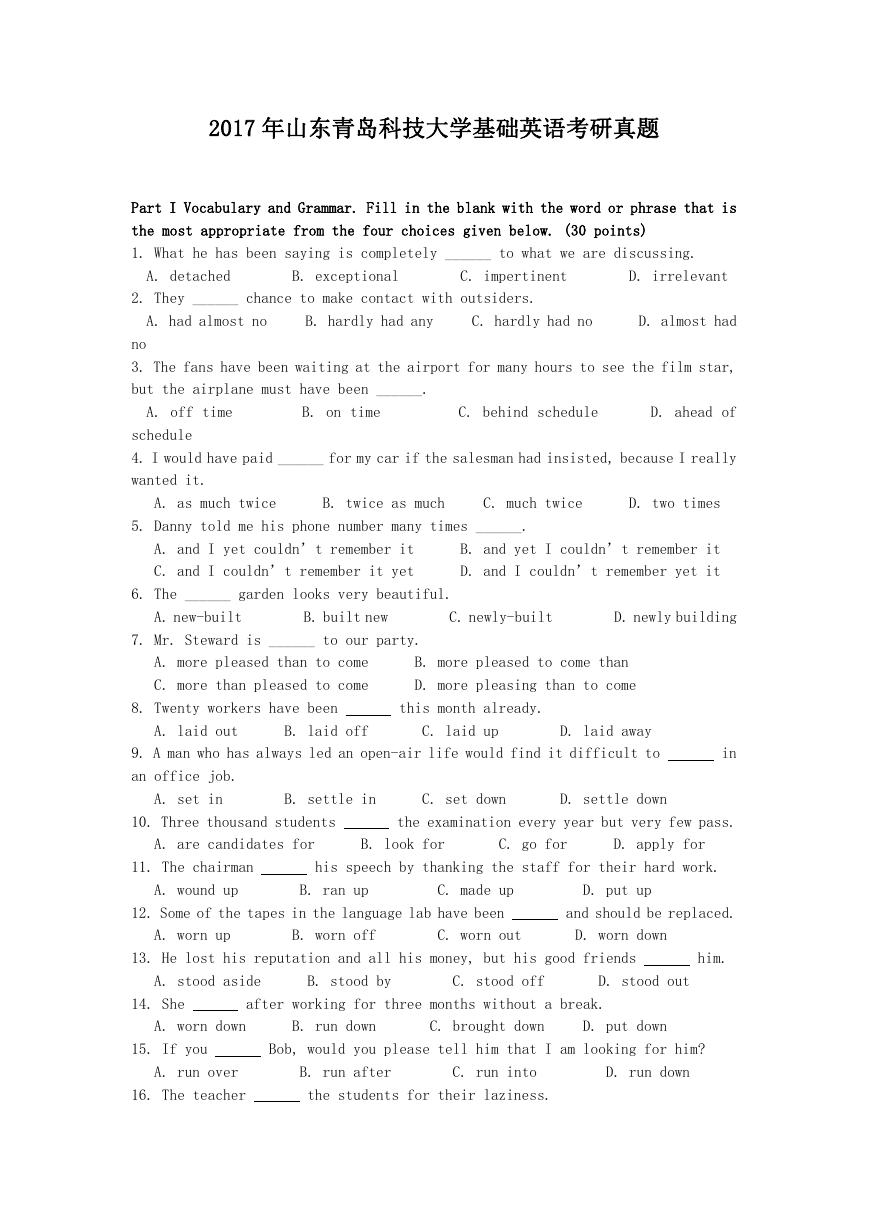
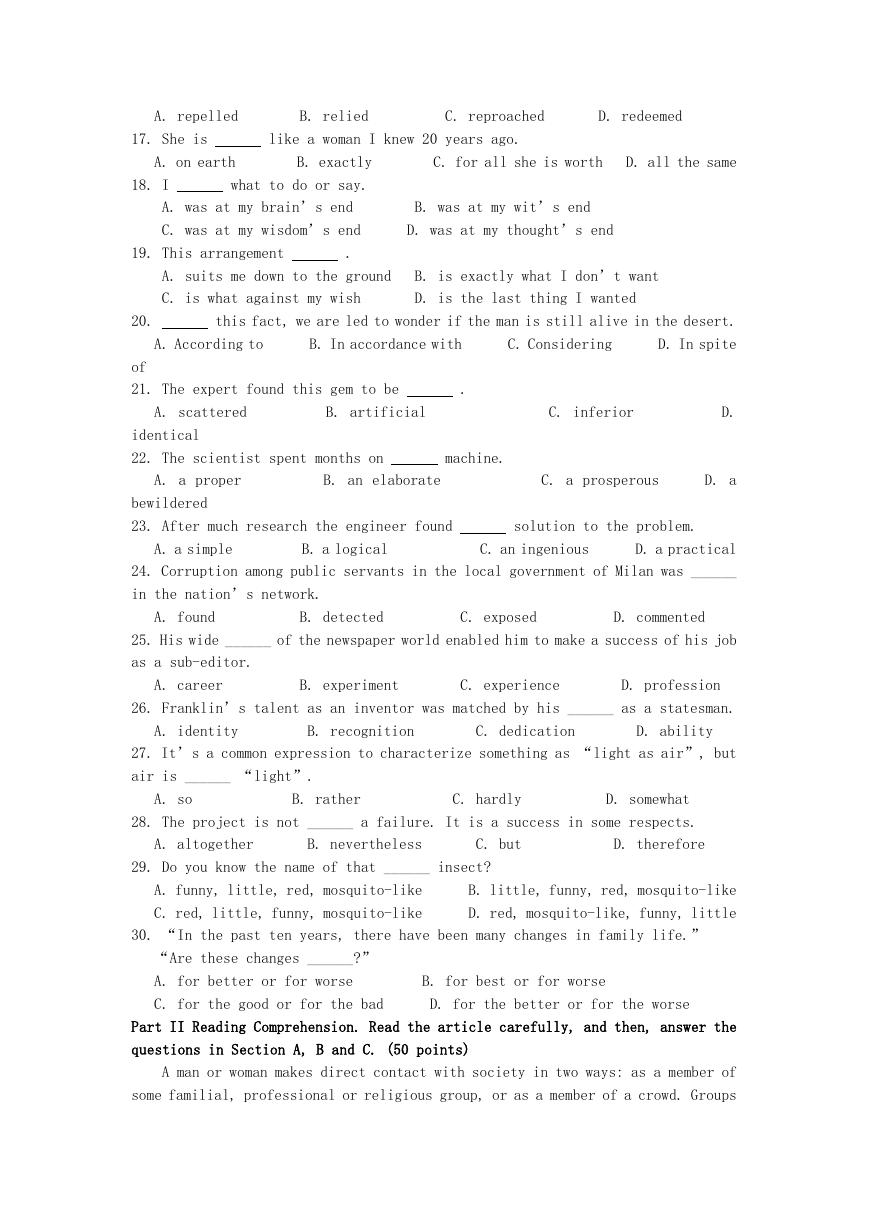
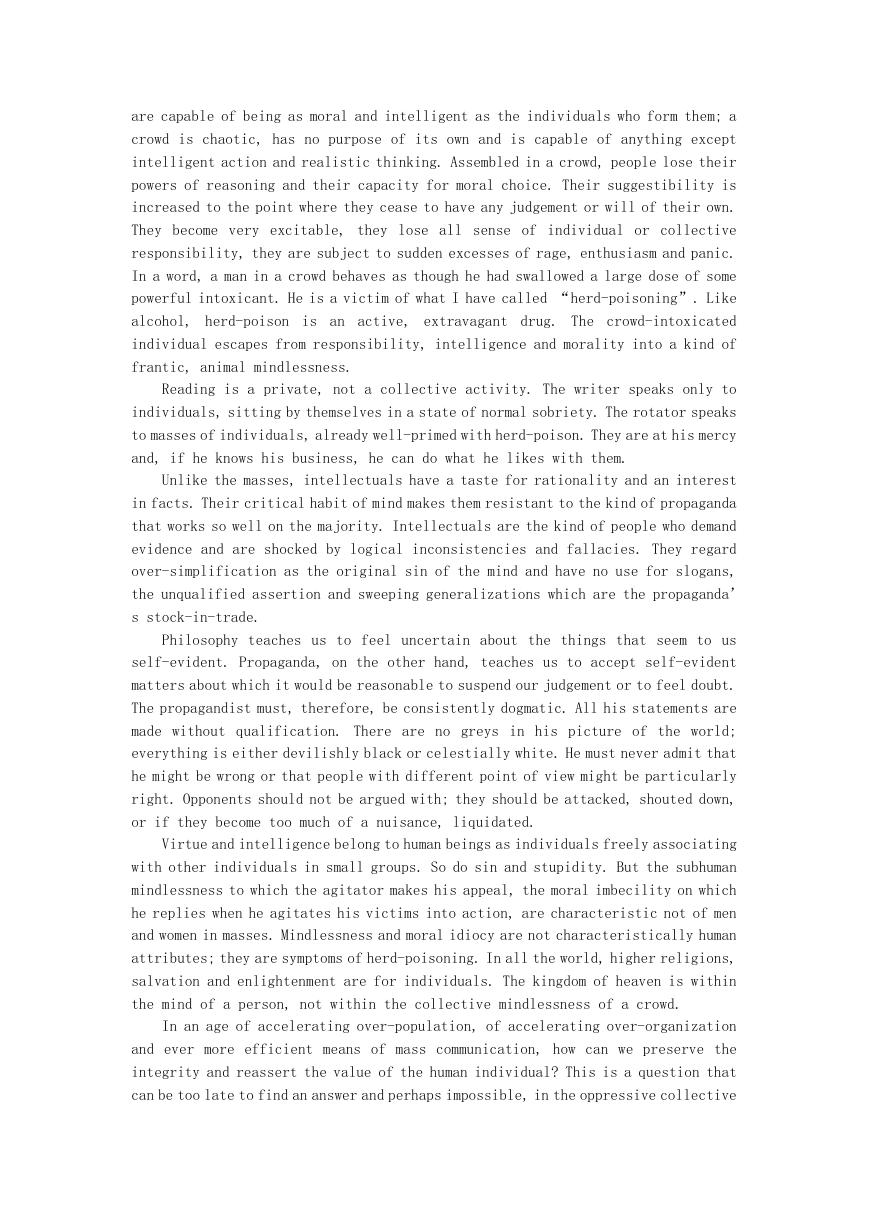
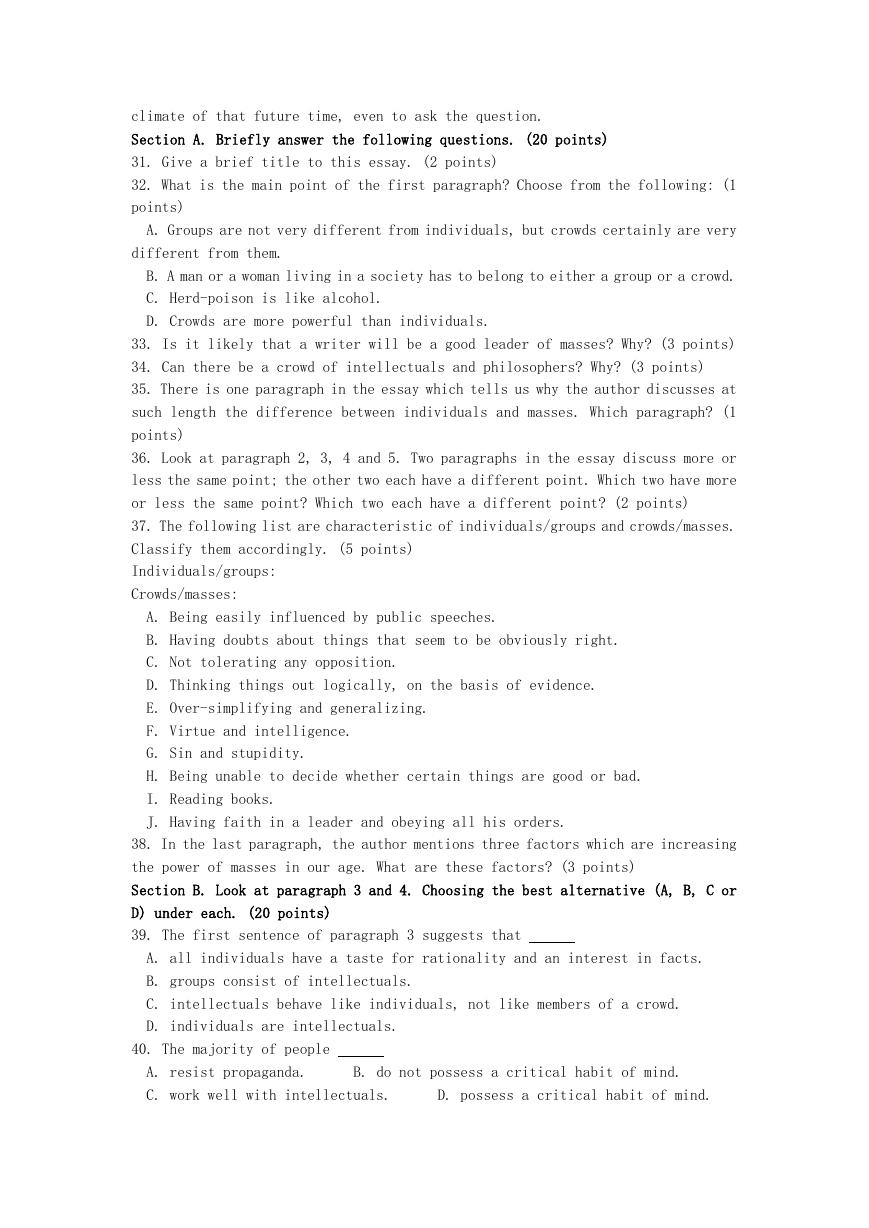
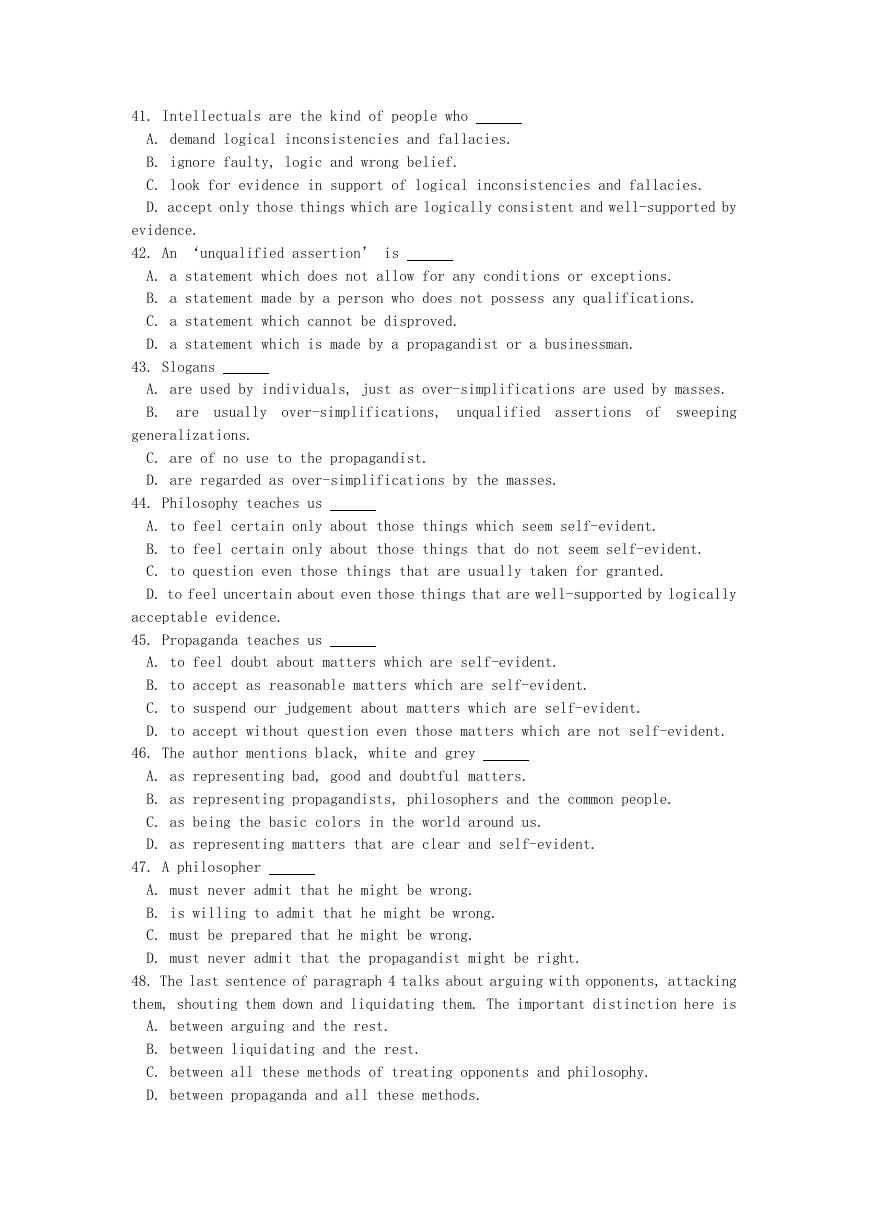
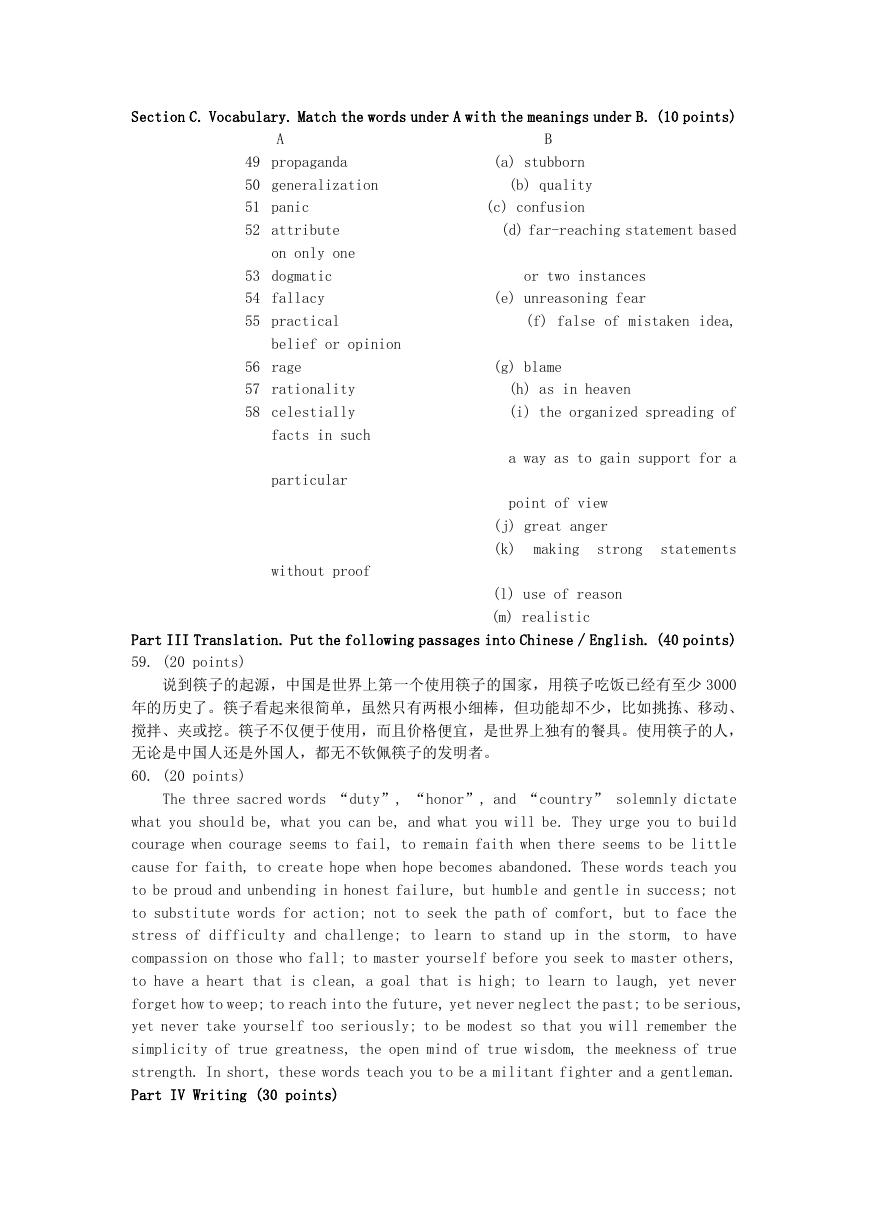
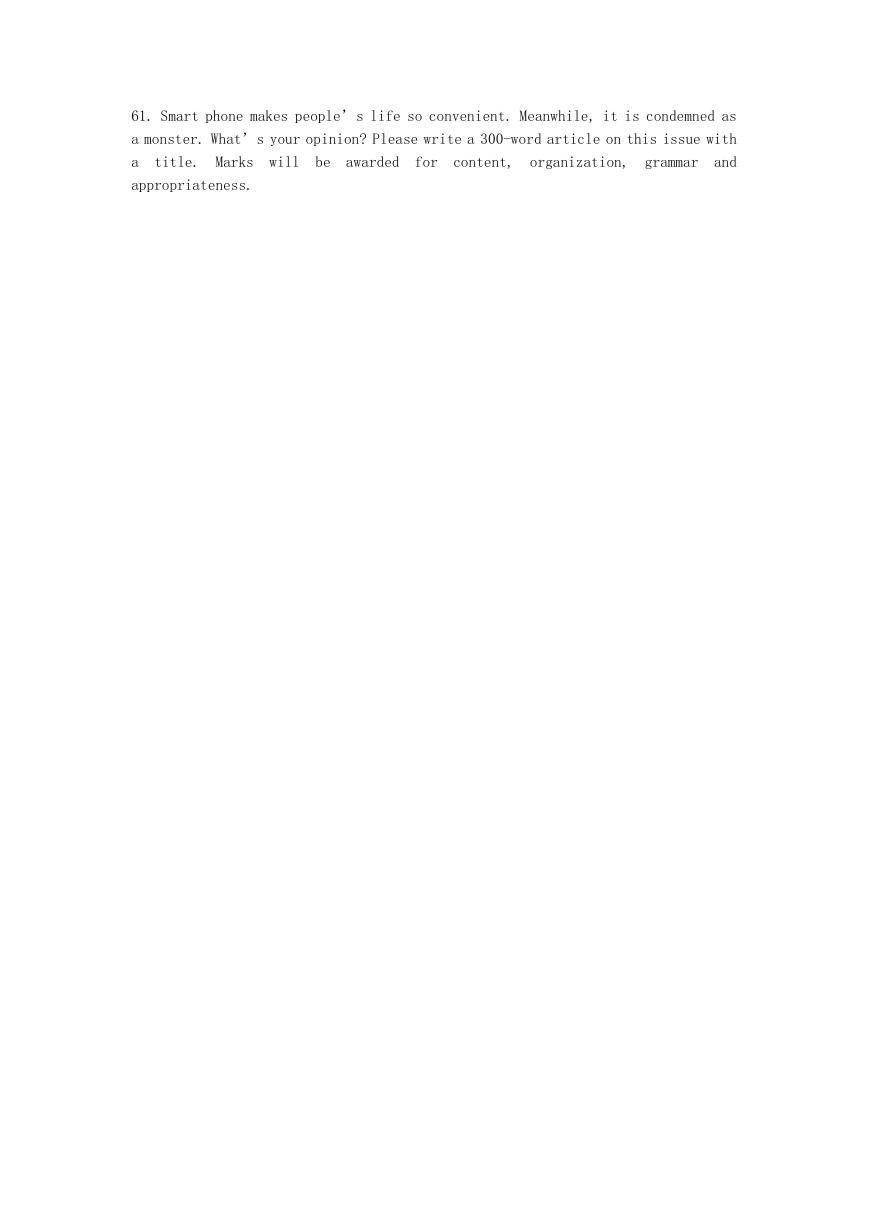







 2023年江西萍乡中考道德与法治真题及答案.doc
2023年江西萍乡中考道德与法治真题及答案.doc 2012年重庆南川中考生物真题及答案.doc
2012年重庆南川中考生物真题及答案.doc 2013年江西师范大学地理学综合及文艺理论基础考研真题.doc
2013年江西师范大学地理学综合及文艺理论基础考研真题.doc 2020年四川甘孜小升初语文真题及答案I卷.doc
2020年四川甘孜小升初语文真题及答案I卷.doc 2020年注册岩土工程师专业基础考试真题及答案.doc
2020年注册岩土工程师专业基础考试真题及答案.doc 2023-2024学年福建省厦门市九年级上学期数学月考试题及答案.doc
2023-2024学年福建省厦门市九年级上学期数学月考试题及答案.doc 2021-2022学年辽宁省沈阳市大东区九年级上学期语文期末试题及答案.doc
2021-2022学年辽宁省沈阳市大东区九年级上学期语文期末试题及答案.doc 2022-2023学年北京东城区初三第一学期物理期末试卷及答案.doc
2022-2023学年北京东城区初三第一学期物理期末试卷及答案.doc 2018上半年江西教师资格初中地理学科知识与教学能力真题及答案.doc
2018上半年江西教师资格初中地理学科知识与教学能力真题及答案.doc 2012年河北国家公务员申论考试真题及答案-省级.doc
2012年河北国家公务员申论考试真题及答案-省级.doc 2020-2021学年江苏省扬州市江都区邵樊片九年级上学期数学第一次质量检测试题及答案.doc
2020-2021学年江苏省扬州市江都区邵樊片九年级上学期数学第一次质量检测试题及答案.doc 2022下半年黑龙江教师资格证中学综合素质真题及答案.doc
2022下半年黑龙江教师资格证中学综合素质真题及答案.doc